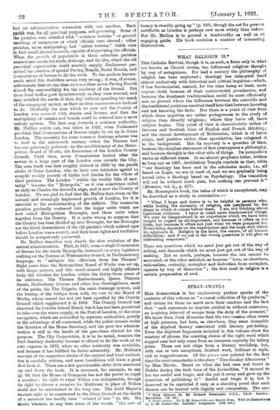WHAT RELIGION IS.* WHAT RELIGION IS.*
THE Catholic Revival, though it is, as such, a force only in what are known as Church oirolee, has influenoed religious thought by way of antagonism. For half a century the philosophy of religion has been neglected ; theology has . interested itself almost exclusively with historical and critical inquiries—which, if less fundamental, seemed, for the time being at least, more urgent—both because of their controversial prominence, and because the dominant traditionalism could be most effectually
met on ground where the difference between the scientific and the traditional positions resolved itself into that between knowing and not knowing the facts. But there is a point of view from
which those inquiries are rather prolegomena to the study of religion than directly religious ; where they leave off, there religion begins. This point of view is characteristic, rather of
German and Scottish than of English and French thinking ; and the recent development of Modernism, which is of Latin origin, and positive rather than speculative, has relegated it to the background. But its recovery is a question of time, because the simplest statement of fact presupposes a philosophy, and because thought is the other side of things. Its perspective varies at different times. In an almost prophetio letter, written as long ago as 1857, Archbishop Temple reminds us that, while " our theology has been cast in the scholastic, mode, i.e., all based on Logic, we are in need of, and we are gradually being forced into, a theology based on Psychology. The transition will not be without much pain, but nothing can prevent it "
(Memoirs, vol. ii., p. 517).
Mx. Bosanquet's book, the value of which is exceptional, may be described as a study in orientation :-
" What I hope and desire is to be helpful to who, while feeling the necessity of religion, are perplexed bythe shape in which it comes before them. I am not thinking about historical criticism. I have in mind more fundamental things. We may be disappointed in an experience which we have been taught to regard as all-important, not because it offers us too little, but because it oilers not just what we were prepared for. Everything depends on the expectation and the hope with which we approach it. Religion is the knot, the centre, of all human. difficulties ; and if we ask it the wrong questions it will give us misleading responses."
There are questions which we must just get out of the way of
asking, and demands which we must just get out of the way of making. Not so much, perhaps, because the one cannot be answered, or the other satisfied, as because " here, as elsewhere, rationalism, curiosity, metaphor and deduction from metaphor, operate by way of distortion" ; the first need in religion is a. certain preparation of soul.










































 Previous page
Previous page